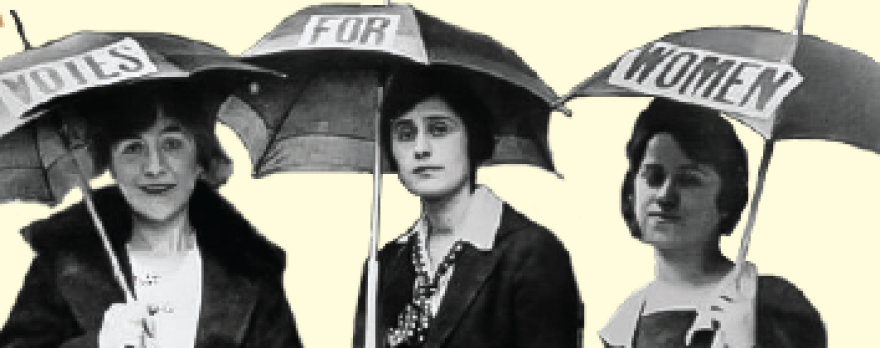To commemorate the 100th anniversary of the 19th Amendment, Utah Public Radio and the Cache County School District, in partnership with the Cache Celebration of Women's Suffrage 2020, sponsored a writing contest for students in elementary, middle, and high school.
An Acces Utah program with the winners can be found here.
Here are the names of the winners, the text of their essays and an audio recording of them reading their essays.

Grades 4-6: Sadie Gallup
Sadie is a 5th grader at Canyon Elementary School and is the daughter of Chari and Jeremy Gallup. Her teacher is Brad Hawkes.
Women Deserve Equal Rights
If you were a girl, how would you feel if you did not have the same rights as the boys? In the late 1800's people believed that women were good for cleaning, cooking, and taking care of children. Many believed they did not deserve the right to vote. Women disagreed, and fought for equal rights.
To begin, heroes are created for doing many amazing things. Who was Seraph Young? She was a hero to women across the United States! She was the first woman to have the opportunity to vote in the United States. She was a 23 year old school teacher from Salt Lake City, Utah. After years were spent with women fighting for the right to vote she was finally given that opportunity in 1870. Her decision to stop and vote on her way to work that day impacted women for years to come. Even today as I watched a video of women earning the right to vote I felt empowered by her choice.
Additionally, as I watched and listened to all the things many women did, including Seraph Young, to be able to finally vote, I imagined how hard it must have been for them. I could feel their frustration and anger. Why were women being treated differently than men? Why weren't we all just seen as people? It allowed me to empathize with black people who also had to fight for equal rights. Men thought women weren't capable of doing the same things as them just as many people also believed black people weren't worthy or capable of doing such things. It makes me feel sad, mad, and frustrated for all of them. I am grateful that today most people do believe that women and men, black or white, are just people and should be treated equally.
Finally, if given the opportunity, I would love to meet Seraph Young and the other women who fought so hard for me to have the right to vote when I turn 18. If I had been alive during that time I think I would have been marching and protesting for equal rights not only as a woman but I would have marched for equal rights for all people. I admire people like Martin Luther King and Alice Paul who never gave up on what they believed in no matter the cost or how hard it was. I hope no matter what happens in my life that I always stand up for what I believe is right.
As you can see, heroes come in many forms. They don't always wear a cape but they do leave a lasting impression on all those around them. I am grateful for all the women before me who sacrificed so much so that I can have the life I do as a young woman and future adult. I'm grateful I can become anything I want to be and there isn't anyone who can stop me.

Middle School: Grant Richardson
Grant is the son of LaNae and Brian Richardson; he attends North Cache Middle School and viewed the video in Ms. Lori Robinson’s history class.
Women’s Suffrage
In 1920, the 19th Amendment finally gave women the right to vote. I already knew a little about Women’s Suffrage but I was still very surprised by the new information that came from the video. My biggest surprise was the great lengths that some courageous people went to for their right to vote. One of these extreme measures was going on a hunger strike. The most common way to go on strike would be to stop working until your wages went up. In this case, however, a hunger strike meant to stop eating while in captivity (jail) until a wrong has been righted.
Alice Paul, along with other suffragists, protested by being “Silent Sentinels”. This means that all of their protests were strong but silent and peaceful. Even though they caused no harm, they were still all sent to jail. There, Alice Paul started a hunger strike.
During this, she was transferred into a psychiatric unit because they thought she was crazy for going to such lengths. There, she was force fed raw eggs through a tube in order to avoid possible death. This made me wonder, did other women go through this same thing to help their cause? In further research I found that they have. If a woman went into a hunger strike, she would most likely be force fed a mixture of bread and water by a tube going up her nose, down her throat, and into her stomach.
The main purpose of Alice Paul’s hunger strike was to bring to attention the horrible conditions at the prison. She wanted people to know that just because of peaceful protesting she was being treated just like a criminal. She had committed no crime! She just wanted to have a vote and voice in the nation.
Another person that intrigued me during this era was a woman named Elizabeth Caddy Stanton. In 1840, at age 25, she was nominated for the World Anti-Slavery Convention in London. However, as she arrived she was told that the male delegates had voted not to allow the women to participate in the event. She and others had to sit in a roped-off section where they couldn’t be seen or heard.
This was sad for Elizabeth and she later wrote, “My experience at the World Anti-Slavery Convention, all I had read of the legal status of women, and the oppression I saw everywhere swept across my soul, intensified now by my personal experiences. It seemed as if all the elements conspired to compel to some onward step. I could not see what to do or where to begin. My only thought was a public meeting for protest and discussion.” Many people at this time had wanted to speak up but she was one of the first to truly act on it. In 1848, she put together the first Women’s Rights Convention in New York.
Once one convention was held, women all over the country started meeting together to brainstorm ideas on how to convince the public to help their cause. These “ideas” included parades, speaking tours, and petitions. Fueled by one person's courage to speak out, the whole country became more united in protests. This showed me that everyone’s thoughts count. Big or small, everyone can do something.
A man that was inspiring to me during this era went by the name of Harry Burn. He was only 24 years old at the time and was the youngest member of the Tennessee Legislature during the passing of the 19th Amendment. For an amendment to be passed it needs to be ratified by 2⁄3 of the states. The last state needed to ratify the new amendment was Tennessee.
However, Tennessee was deadlocked in a tie. As the legislature voted again the next day to break the tie, something extraordinary happened. Harry Burn came intending to vote no to the amendment but paused to read a note from his mother before the vote. It read, “Dear son, hurray for the vote for suffrage!” They voted again and this time under immense pressure, he said yes. Due to the courage of one man, Harry Burn, about 26 million women were suddenly able to vote in the election of 1920 and from then on.
I just loved listening to these stories and learning what brave individuals did to change the Constitution for the better. It’s amazing to think that these people weren’t heroes, they were just ordinary people wanting to make a difference. It’s also encouraging to know that the things that aren’t right in the world don’t have to stay that way. Their example doesn’t have to be a thing of the past. We can be courageous today, and together we can change the world for the better.

High School: Jenna Campbell
Jenna is a junior at Ridgeline High School. The daughter of Hilary and Adam Campbell, Jenna found the essay competition herself, but AP teachers in English and History, Phil Wade and Julie Major, served as mentors.
Throughout history, women have frequently been regulated to a supporting role. Many historians have noted the lack of women throughout the story of humanity. There seems to have been an abundance of critically important men turning the wheels of civilization: the Caesars, Gutenburgs, Columbuses, and Einsteins of the world. However, for making up half of the global population, women seemed to have a remarkably minuscule role in the development of the world as we know it.
For thousands of years, the voices of decisive women have all but been silenced completely. One needs to look no further for examples of the suppressed role of women than many famous works of literature, such as the novel Frankenstein. In the novel, it is clear that women are almost entirely the property of the men in their lives. For example, a female character is given to another character, Victor Frankenstein, as a “pretty present,” as if she were nothing but an unfeeling object. This instance clearly demonstrated the perceived inferiority of women, apparently incapable of taking care of themselves. Likewise, women often had unrealistic and confining expectations of their behavior, desires, and interests forced upon them.
However, women have not always accepted the expectation of their carefully controlled existence. This year marks the centennial celebration of the passage of the 19th amendment, which granted women the right to vote in the United States. Women’s suffrage was the result of generations of women steadfastly pushing for equality. However, despite the efforts of these valiant women, the fight for both universal suffrage and equal rights is not over. Historically, the Seneca Falls Convention in 1848 is credited with beginning the Women’s suffrage movement in the United States, but few realize how truly significant the event was. At the time, America adhered to the global characterization of women. A woman was expected to be quiet, obedient, and contentedly focused entirely on her home as her sole sphere of influence. The men would be the ones to handle politics and other “important matters” women were viewed as too fragile to manage. Despite this, the convention controversially proclaimed in the famous Declaration of Sentiments that “We hold these truths to be self-evident; that all men and women are created equal,” and demanded that women be granted the right to vote. While the 19th amendment wouldn’t be signed and ratified for another 70 years, this historic convention was a key event as it marked the being of the struggle for equality.
In the years after the Seneca Falls Convention, prominent leaders rose up as a voice for the millions of women that had previously been silenced. Elizabeth Cady Stanton, Susan B. Anthony, Alice Paul, and others courageously led the charge. The fight for women’s suffrage was called a “fight” for a reason, however, suffragists were rejected, persecuted, and ignored at nearly every step of the way. However, these unflinching women refused to back down, realizing that the cost was overwhelmingly outweighed by the potential reward. The suffragists endured open attack, ridicule, and other hardships, but decades of effort and protest would come to fruition on August 18, 1920, when the 19th amendment was passed. Women across the nation celebrated but realized that their work was far from finished. By 1923, Alice Paul, a militant suffragist, pushed for the passage of an Equal Rights Amendment to the Constitution, realizing that having the vote did not necessarily mean equality for all. Yet this critical proposed amendment was brushed aside as it was considered to be too radical. Consequently, women gained suffrage, an essential step, but failed to achieve their true objective: equal rights for every American citizen.
For the last century, women have been in a constant struggle to achieve equality. While the nation is presently closer than it ever has been before to the completion of this goal, there remain many obstacles to overcome. Many movements have developed throughout the last 100 years as women labor to be recognized for their contributions and to be adequately represented. The recent #MeToo movement and women’s marches have emerged as a direct consequence of the failure of society to give women the acknowledgment they deserve. Therefore, the continuation of the fight for equality is very much a cause worth standing up for.


